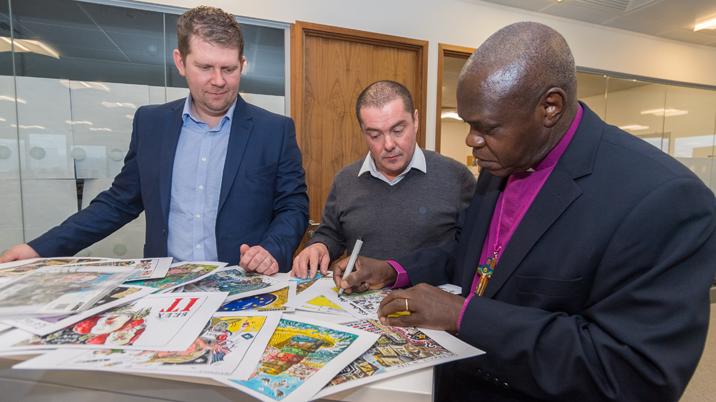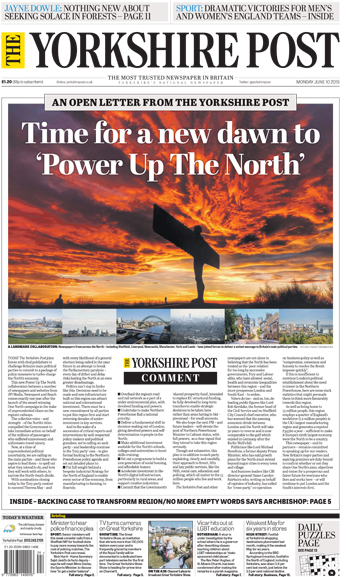
James Mitchinson, editor of The Yorkshire Post, was following his usual morning routine, out walking his dog at 5.30am and clearing emails from his mobile, when he came across a startling message.
Margaret, a life-long Yorkshire Post reader whose family had taken the paper for generations, had got in touch to say she was cancelling her subscription because of a story about a sick boy who had lain on a pile of coats on the floor of Leeds General Infirmary for thirteen hours because no bed had been available.
The reason for the cancellation threat was that Margaret had read a story on Facebook saying that a friend of a friend who knew someone who worked at the hospital had said the story was untrue.
The experience of four-year-old Jack Williment-Barr, which appeared in the Yorkshire Evening Post first, followed by The Yorkshire Post, was picked up by nationals such as the Daily Mirror and then went round the world.
Because it happened in the run-up to the December general election, it was political dynamite. The issue was raised by Labour leader Jeremy Corbyn, and Prime Minister Boris Johnson famously pocketed the phone of an ITV reporter who tried to show him a picture of Jack lying on coats.
Mitchinson is however mainly interested in how the story by one of his reporters Dan Sheridan, came to be denounced on social media as fake news and Margaret’s reaction to what she saw on Facebook.
He is also very conscious that newspapers like his are often tarred in the public mind with the activities of the worst of the tabloids – the behaviour that led to the Leveson inquiry.
Mitchinson last year accused The Sun of “heaping shame” on journalism after the paper splashed on a 30-year-old story about the shooting in New Zealand of the half-brother and half-sister of England cricketer Ben Stokes.
“I would have spiked it (the Stokes story). Sometimes you have to make decisions about what is right and what is wrong. You might get a story past the lawyers but your readers might think, what a shitty thing to do,” explains Mitchinson.
The Yorkshire Post editor replied immediately to Margaret because he was “angry and more than a little perturbed that the relationship we have with our readers was being, eroded, dismantled by God knows who on Facebook.”
Mitchinson told Margaret that the story had been confirmed by hospital clinicians and the executives at the hospital trust had apologised, explaining that the hospital had faced its busiest night for three years.
Margaret too apologised, felt sheepish about being conned by a Facebook account that disappeared overnight, and is still a reader of The Yorkshire Post.
“But how many Margarets are still out there who didn’t make contact with the editor, and who still believe the Facebook post,” asks Mitchinson who sees it as a cautionary tale on what will continue to happen if newspapers “don’t get a hold of the internet”.
Sometimes you have to make decisions about what is right and what is wrong.
New code needed
The urgent task, he believes, is to start aligning online publishing with the values of a properly functioning democracy such as that of the UK.
Mitchinson believes political action is needed to tackle the way “the behemoths of the internet” are allowed to neglect their tax liabilities, neglect their publishing responsibilities and continuously deny responsibility for the content they carry.
At the same time, he is critical of some publishers who commission “unconscionable content” in order to be rewarded by programmatic revenues from indiscriminate paymasters on the internet.
The most important development the Yorkshire Post editor would like to see is the creation of a responsible publisher’s code aligned to a conscientious advertiser’s network.
Then, chief executives, both domestically and around the world, could acknowledge that they too have a part to play and refuse to allow their revenues to flow “into this indiscriminate world where they don’t know whether they are funding hate or otherwise”.
For Mitchinson, it’s time to “scorch the earth” where hate has been allowed to fester for far too long.
Mitchinson would like to see the creation of a responsible publisher’s code aligned to a conscientious advertiser’s network.
Impact of Covid
He is speaking from his home from where he has been editing the paper since March 18th – five days before the government lockdown announcement. Mitchinson initially saw it as a one-day trial but it went so well that it has simply continued ever since.
It’s been tough but the Yorkshire Post has had a relatively good lockdown, to the extent that such a thing is possible. Subscribers to the paper’s digital app are up by 300 per cent and the £2.50 weekend edition was initially down by 5,000 from 40,000 but quickly returned “to the pre-Covid run rate”.
Weekday sales are down between 10 and 15 per cent largely because so many potential readers have not been in the centre of Leeds.
Mitchinson says he has not got absolute numbers on circulation because, like the Daily Telegraph, the Yorkshire Post has withdrawn from the ABC system and the new independent audit has not yet been published.
The average weekday circulation for July to December 2019 was 17,551.
The Yorkshire Post editor believes there will eventually be a return to the paper’s headquarters in Leeds because remote working may be fine for experienced journalists but how do you bring on apprentices without a newsroom?
“But we won’t flick a switch and all plod back into the office,” promises Mitchinson who notes that the productivity of his 50 journalists has been increased greatly by the time saved from not having to travel to work.
There have also been other unexpected benefits.
“It’s been widely documented that our staff have taken some pay cuts but by not commuting in and not incurring childcare costs, many have a bit more money in their pocket than they did before,” argues Mitchinson.
Newspaper of the Year
There was one big highlight of the lockdown for Mitchinson. The Yorkshire Post, which tags itself as Yorkshire’s National Newspaper, won the Society of Editors regional newspaper of the year for large dailies – an award the paper has not won for more than twenty years.

For Mitchinson, coming in the middle of lockdown, it was an emotional experience.
“I cried, yes. I had a little moment. It was because of the cliff edge that hit us in March when the country went into lockdown and we were all in back bedrooms and we had to adapt overnight that made me suddenly emotional,” says Mitchinson.
He saw the award as reflecting the craft and endeavour for all those involved in “turning out beautifully written, properly punctuated pages for an ABC1 audience”.
And although The Yorkshire Post is famous for breaking the story of the Edward VIII abdication crisis in 1936, the paper won the regional award this year without the help of any huge breaking stories.
Mitchinson says he was equally pleased with another “award” – being accredited by PAMCo, the all-industry audience measurement organisation, with being Britain’s most trusted newspaper.
“That’s a really reassuring vindication of the time and effort that goes into checking things and then checking them again,” says 40-year-old Mitchinson who gave up a promising career in retail banking and £20,000 a year to become an £8,000 a year trainee on his home town Worksop Guardian, a decision that initially mystified his coal miner father.
After going through all the jobs at the Worksop Guardian including editor, he believes that local and regional journalism is now at a crossroads, society has to decide whether or not to support properly produced local journalism for the betterment of the local community.
Society has to decide whether or not to support properly produced local journalism for the betterment of the local community.
Quality and trust
Mitchinson is convinced that The Yorkshire Post, now owned by JPI Media, the successor organisation to Johnston Press, can not only survive but thrive in future and that the key is quality and trust.
For that to happen, “we are going to have to produce brilliant journalism and digital products intuitively used which do not disrupt the reader experience, informed by the people it serves rather than independently ploughing its own furrow purporting or pretending to know best.”
Mitchinson has had one notable failure this year. When a vacancy arose for a new chief football writer, he encouraged women to apply to do something about the all-male sports team he inherited, and then appointed yet another man.
“We recruited on merit. That’s the game we are in but it doesn’t detract from my frustration and commitment to level the playing field because there just aren’t enough women represented in sports teams, full stop,” admits Mitchinson.
If anyone out there, he suggests, has any ideas about how best to increase the diversity of sports teams and newsrooms, the editor of The Yorkshire Post would like to hear from them.
At least, whoever the football writers are, they will have, in Leeds United, a Premier League team after nearly twenty years outside the top division. It will be a boost for Leeds and The Yorkshire Post even though Mitchinson is a loyal supporter of lowly Mansfield Town in League Two.
As for the future, Mitchinson makes a series of largely optimistic assumptions – that if he keeps up quality and maintains standards, readers will stay loyal and advertisers who have had to withdraw their advertising for understandable reasons during the pandemic will return in better times.
“One hopes they (advertisers) will see our determination to remain the best newspaper in the country and that they will see the benefit of having such a good highly trusted paper of record for the county and that they will see there is value in that,” says the Yorkshire Post editor.
One can only hope he is right.
Meanwhile, the mantra for the paper will be “test and learn” even if that means a few failures along the way.
Ironically in the circumstances, James Mitchinson reaches for inspiration to a social media giant, Google, which famously insisted its staff must “fail fast”.
This article was first published in InPublishing magazine. If you would like to be added to the free mailing list, please register here.












